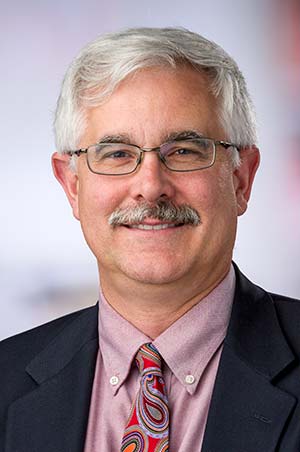Lee D. Cranmer, MD, PhD, FACP
Professor
Clinical Research Division, Fred Hutch
Program Director, Bob and Eileen Gilman Family Sarcoma Research Program
Clinical Research Division, Fred Hutch
Dr. Lee Cranmer is dedicated to translating lab findings into new clinical advances for patients with sarcoma or skin cancers. He designs and leads clinical trials of new therapies for these cancers, including targeted drugs and immunotherapies, from Phase 1 studies to national cooperative-group trials. He has also carried out preclinical studies on the biology of these diseases and new drugs that might exploit biological weaknesses. As director of the Bob and Eileen Gilman Family Sarcoma Clinic and Sarcoma Clinical Research Program at Fred Hutch and University of Washington, Dr. Cranmer is responsible for nurturing sarcoma-related research, teaching and outreach within the Fred Hutch/University of Washington/Seattle Children's Cancer Consortium.
Clinical Expertise
Dr. Cranmer is board certified in Internal Medicine and Medical Oncology, and a practicing member in the Southwest Oncology Group. He is an expert in the clinical management of sarcoma, and melanoma and non-melanoma skin cancers. He has been directly involved in the design and/or execution of over 70 institutional-, industry- and national cooperative group-sponsored therapeutic clinical trials for melanoma and sarcoma patients, in addition to phase I solid tumor protocols. These have included trials of molecularly targeted therapies and immune-boosting therapies, such as immune checkpoint inhibitors. He treats patients at the Fred Hutchinson Cancer Center and is focused on supporting and expanding sarcoma research collaborations at Fred Hutch and UW, including the development of local clinical trials, involvement in national clinical trials, teaching and mentoring hematology-oncology fellows and community-outreach activities.
Research Expertise
Dr. Cranmer has a variety of ongoing translational research interests. In melanoma, these include the biology of brain metastasis development, the biological significance of ulceration, and the significance of osteonectin and mutant B-Raf kinase expression in melanoma specimens. In sarcomas, he is investigating the activity of a number of novel anti-neoplastic agents in pre-clinical models, both alone and in combination with conventional chemotherapy agents, and working to understand the molecular basis of drug efficacy in these models.
Current Studies – Principal Investigator on:
Efatutazone Dihydrochloride in Treating Patients With Previously Treated Myxoid Liposarcoma That Cannot Be Removed by Surgery
Sapanisertib or Pazopanib Hydrochloride in Treating Patients With Locally Advanced or Metastatic Sarcoma
A Phase 2 Study of ABI-009 in Patients With Advanced Malignant Perivascular Epithelioid Cell Tumors (PEComa)
Other Appointments & Affiliations
Professor of Medicine, University of Washington, Division of Hematology and Oncology, Department of MedicineProfessor of Medicine
University of Washington, Division of Hematology and Oncology, Department of Medicine
Attending Physician
University of Washington Medical Center and Fred Hutchinson Cancer Center
Curtis and Elizabeth Anderson Endowed Professor in Sarcoma Research
Division of Hematology and Oncology, University of Washington
Education
Fellowship: Medical Oncology, University of Arizona Cancer Center
Residency: Internal Medicine, The Mayo Clinic
University of Arizona, College of Public Health, 2016, MPH
University of California, San Diego, 1998, MD
University of California, San Diego, 1997, PhD (Biology)
University of Liverpool, School of Tropical Medicine, 1989, MSc (Parasitology)
Harvard University, 1988, BA (cum laude, Biochemical Sciences)
